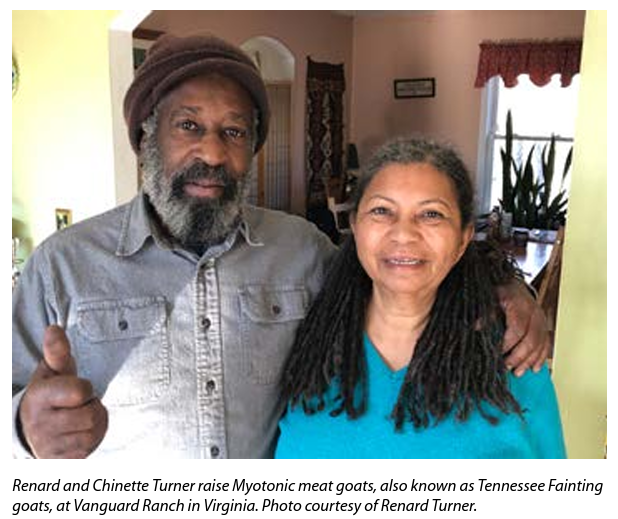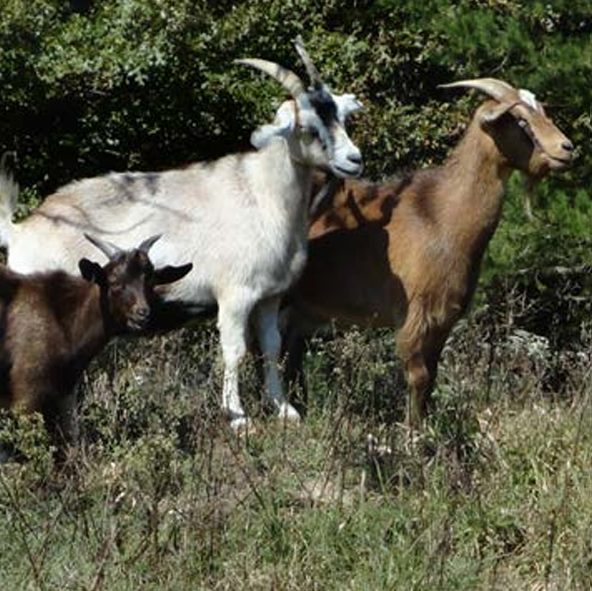By Renard Turner
Editor’s Note: This article originally appeared in the Winter 2021 issue of The Livestock Conservancy Newsletter. We are sharing it again as part of “Goat Month.”
Renard Turner and his wife Chinette own Vanguard Ranch in central Virginia, where they have raised registered Horned Dorset sheep, Karakul sheep, Kiko goats, Spanish goats and horses. They currently raise Myotonic goats, white utility king squabs and organic herbs and vegetables. Renard is passionate about conservation and is a former member of The Livestock Conservancy Board of Directors.
We began raising meat goats on our farm close to 20 years ago. We tried several breeds of sheep and even ostrich before finally settling on raising meat goats. Our journey began at a Peruvian Paso horse show where the catalog included an article about meat goats. The article clearly stated that the domestic demand for goat meat far exceeded its availability in America.
I soon began researching meat goats. Over the years, at Vanguard Ranch in Virginia, we tried most of the goat breeds and crosses available in the United States. We learned a lot. A whole lot. The market for meat goats is focused around three main options: (1) breeding purebred seed stock for other producers, (2) raising commercial meat goats for slaughter markets and (3) breeding goats for show purposes, with the pet goat market being another minor option.
WE DEVELOPED OUR OWN NICHE
We decided to raise meat goats and retain the meat at Vanguard Ranch. We have our goats processed, then we cook and sell our goat as a ready-to-eat meal from our own concession trailer. This is value-added marketing.
We found that the American public will eat goat meat readily. Anyone with teeth that eats meat will eat goat meat. We serve ours up as goat burgers, curried goat, and kabobs. We also made goat fried rice and folks loved it all! Many come back for seconds.
Value-added works for us. We retain control of our product from start to finish. Cut out the middleman whenever possible, friends. Retain more profit for your farm.
THAT MYOTONIC MOMENT
We purchased two Purebred Myotonic bucklings from Dr. Phil Sponenberg. We just kept them as an experiment. My wife Chinette really liked them. She liked that they were “cute,” smaller, and easier to handle.
For many years we raised another breed of meat goat. Our processor always asked me how in the world could I make any money with the high cost of processing he was charging us? He did not grasp the value-added part. He was thinking like a butcher and based his financial margins only on slaughter market prices.
One day I brought him six half Myotonic kids for processing bred from one Myotonic buck. After processing and hanging them, my processor asked “what are you doing differently?” These kids were meatier and he wanted to buy them for himself!
He STRONGLY suggested that I ditch the other skinny goat breed and just bring him more like the first six. It took him less time to process and the yield in product was greater. The difference was obvious. I do not believe in telling the shoemaker how to make shoes.
Thankfully, I listened to him and phased out the more expensive imported goats for good. The Myotonic genetics proved their value and we embarked on a new journey to change our herd to all purebred Myotonic meat goats. We have never looked back. Myotonic meat goats work well for us. Thickness matters!
GENETICS MATTER
Myotonic meat goats on our farm are selected for the ability to raise twins on forage. We also select for overall thickness and a moderate growth rate. We found that our does are great mothers, kidding unassisted. They nurse twins with no problem.
The objective is not to change the breed but simply improve through judicious culling. We cull to the grill. Myotonic goats do produce more meat on less inputs with an obvious increase in the muscle to bone ratio. Couple that with a high conversion ratio on forage and you have winners in the field.
One of the advantages of raising a rare breed of goat is that we tell the story of the Myotonic breed when we sell it to our customers on a plate. Most people find the story interesting and enjoy eating something special.
We now get to help preserve a rare breed of goat that is a perfect homesteader’s goat while we create income streams as both a value-added ready-to-eat meal and as select purebred breeding stock. We like that they are easier to fence, easy keepers on forage, great mothers, easy to handle, and “cute.”
GO VALUE-ADDED
I encourage others farmers to consider value-added as a method to make your farms more viable economically. It is still a challenge, but the field is not crowded. There is room to shine if you are willing to put in the work.
Helping to preserve a rare breed is great, yet one still needs an end market for the offspring. Selection for real-world working goat qualities helps to increase the breed’s viability, thus ensuring its perpetuation as a breed.
As our nation moves to a greener, more local food supply many people are desiring locally sourced meats they can trust. Consider the option of killing two birds with one stone. Helping to preserve a unique North American landrace breed while providing a special product to niche markets can work well. If you are interested in the concession business, contact us. We can help. In concessions, you set your price!
Myotonic meat goats that we raise are medium to large sized, thick set, and naturally healthy. We seldom have to trim hooves or worm on our farm. We provide a free choice organic loose mineral mix, automatic watering, and free-range forage all the time. Our goats are easy keepers on pasture.
Myotonic meat goats can add value to your farm. Why not help preserve a unique genetic package that is indigenous to this continent? The lure of the exotic is not always worth the price of admission. We named our linebred family of Myotonic goats, “BANGUS,” because they give us more bang for our buck! We have a closed herd, we cull to the grill and only breed a select number yearly to allow us to be sustainable.
Consider giving Myotonic meat goats a try. Support The Livestock Conservancy. You can help make a difference! Learn more about Vanguard Ranch on Facebook.
WHAT’S IN A NAME?
Myotonic goats have many names, including Tennessee Fainting, Tennessee Meat, Texas Wooden Leg, Stiff, Nervous and Scare goats.
These other names refer to a breed characteristic known as myotonia congenita, a condition in which the muscle cells experience prolonged contraction when the goat is startled. The transitory stiffness associated with these contractions can cause the goat to fall down. This is not a true faint, but a muscular phenomenon unrelated to the nervous system.




